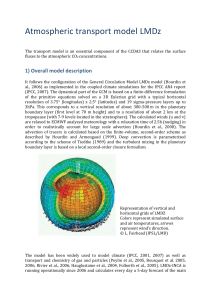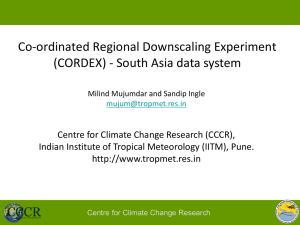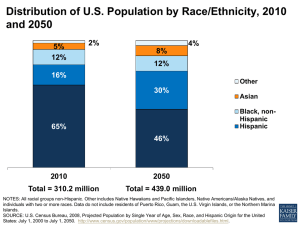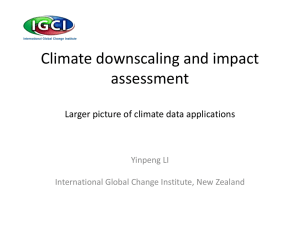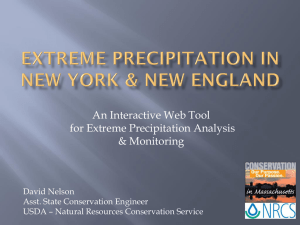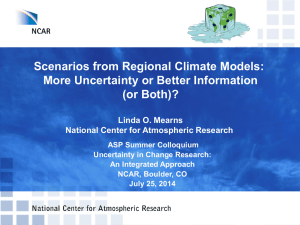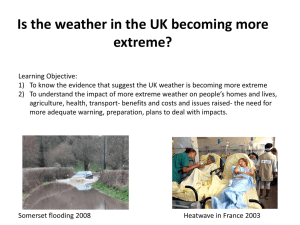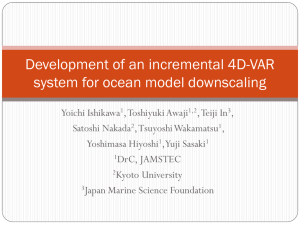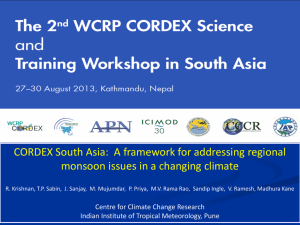What can we expect from LMDZ in terms of regional climate studies?
advertisement
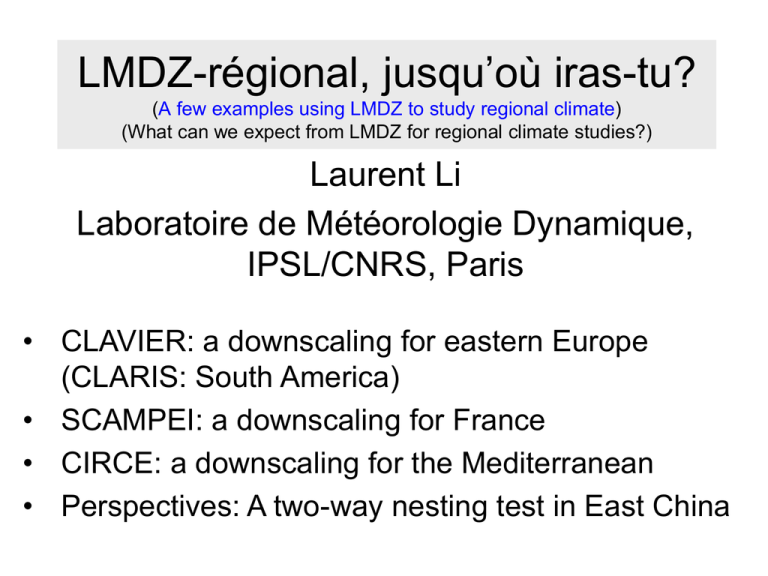
LMDZ-régional, jusqu’où iras-tu? (A few examples using LMDZ to study regional climate) (What can we expect from LMDZ for regional climate studies?) Laurent Li Laboratoire de Météorologie Dynamique, IPSL/CNRS, Paris • CLAVIER: a downscaling for eastern Europe (CLARIS: South America) • SCAMPEI: a downscaling for France • CIRCE: a downscaling for the Mediterranean • Perspectives: A two-way nesting test in East China The IPSL Earth System Model Continents Atmosphere Orchidée Physics LMDZT NEMO/OPA LMDZ Atmospheric Circulatio n Continental surface hydrology Oceans ORCALIM Ocean Circulation Sea Ice STOMATE NEMO/TOP/PISCES Carbon Cycle Continental Biochemistry Marine biochemistry Carbon CO2 Carbon INCA Chemistry Gases CH4, COV, Chemistry Aérosols & Aérosols Aerosols DMS Nutriments Marine salts LMDZ-regional: Med version • LMDZ-Med is a global atmospheric GCM with variable grid and a zoom over the Mediterranean basin. Local resolution: 30 km. • It is run as a regional climate model, with nudging conditions (every 6 hours) from a global model (LMDZ-g, ERA40, IPCC, etc.) at low resolution outside the zoom. The model is free to have its own behaviours inside the zoom. CLAVIER: a climate downscaling study for Eastern Europe - LMDZ - REMO5.0 - REMO5.7 LMDZ REMO REMO2 Evolution of T2m and Prec in Eastern Europe LMDZ-regional and REMO for climate change downscaling (ECHAM A1B) in Eastern Europe (2021/2050 – 1961/1990) LMDZ REMO5.7 REMO5.0 Surface air temperature Rainfall rate LMDZ-regional climate change downscaling (3 different scenarios) in Eastern Europe (2021/2050 – 1961/1990) IPSL-A1B ECHAM-A1B ECHAM-B1 Surface air temperature Rainfall rate http://www.lmd.jussieu.fr/~li/claris Configuration of LMDZ-sudam: -irregular rectangular lat/lon grid -152x150 points in the domain -about 0.48° -very week relaxation inside ERAinterim: Global 0.75° 4xdaily. Reanalysis (1989/2008, 20 years) Scenario runs: Driven by IPSL-CM4 and ECHAM5 global models with the scenario A1B (1951/2100, 150 years). A downscaling study for France: • Three versions: Global / Europe / France • Two-way nesting between Global/Europe • One-way nesting from Europe to France LMDZ grid schemes for the whole earth (left), for Europe (middle) and for France (right) in three versions LMDZ Globe (300 km) LMDZ Europe (100 km) LMDZ France (20 km) Two-way nesting between LMDZ-regional and LMDZ-global Global Regional Annual rainfall (mm/yr) Changes of annual-mean rainfall (mm/day) (2050 – 2000) regional Rainfall averaged over France (mm/d) global 1951 2050 Pr (mm/day), Tx(°C) et Tn (°C) for a return level at 50 years in Marseille, observation and 3 resolutions of LMDZ Pr Obs 300km 100km 20km Tx Obs 300km 100km 20km 1961/1990 145 43 42 62 1961/1990 38.9 32.2 34.7 35.6 2021/2050 ? 38 56 93 2021/2050 ? 36.0 36.9 37.5 Tn Obs 300km 100km 20km 1961/1990 26.2 21.7 24.8 25.6 2021/2050 ? 24.0 27.0 27.8 Pr: precipitation Tx: daily-maxi temperature Tn: daily-mini temperature CIRCE: Build a regional coupled model for the Mediterranean Global buffer zone buffer zone Regional Global O-A coupled model: LMDZ-global / ORCA2 Two atmospheric models are coupled through buffer zones Regional O-A coupled model: LMDZ-regional / MED8 Two oceanic models are also coupled through buffer zones Schematic of the quardruple coupling in IPSL: M4 Zonal overturning stream function (Sv) for the whole Mediterranean Sea in IPSL-CM4, ERA40 and GR simulations respectively. Time evolution of the annual-mean SST averaged for the whole Mediterranean Sea. Black curves are from regional coupled models, driven by ERA40, realized in CNRM, LMD, ENEA and MPI respectively. Added values of high resolution and two-way nesting Feedbacks from LMDZ-regional to LMDZ-global: vers une superparamétrisation? 2way – 1way in LMDZ-global: 700-hPa height and wind Two-way nesting between LMDZ-regional and LMDZ-global Added values of LMDZ-regional: extremes Spectral distribution of rainfall in southeast China, comparison between the observation, LMDZ/CTRL, LMDZ/CTRL2, and a few other coarse-resolution global models. Added values of high-resolution models can be clearly identified.
